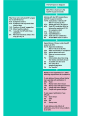Expectations for consultations and antibiotics for respiratory tract infection in primary care: the RTI clinical iceberg
- PMID: 23834879
- PMCID: PMC3693799
- DOI: 10.3399/bjgp13X669149
Expectations for consultations and antibiotics for respiratory tract infection in primary care: the RTI clinical iceberg
Abstract
Background: Respiratory tract infection (RTI) is the commonest indication for community antibiotic prescriptions. Prescribing is rising and is influenced by patients' consulting behaviour and beliefs.
Aim: To build up a profile of the 'RTI clinical iceberg' by exploring how the general public manage RTI, visit GPs and why.
Design and setting: Two-phase qualitative and quantitative study in England.
Method: Qualitative interviews with 17 participants with acute RTI visiting pharmacies in England, and face-to-face questionnaire survey of 1767 adults ≥15 years in households in England during January 2011.
Results: Qualitative interviews: interviewees with RTI visited GPs if they considered their symptoms were prolonged, or severe enough to cause pain, or interfered with daily activities or sleep. Questionnaire: 58% reported having had an RTI in the previous 6 months, and 19.7% (95% CI = 16.8 to 22.9%) of these contacted or visited their GP surgery for this, most commonly because 'the symptoms were severe'; or 'after several days the symptoms hadn't improved'; 10.3% of those experiencing an RTI (or 53.1% of those contacting their GP about it) expected an antibiotic prescription. Responders were more likely to believe antibiotics would be effective for a cough with green rather than clear phlegm. Perceptions of side effects of antibiotics did not influence expectations for antibiotics. Almost all who reported asking for an antibiotic were prescribed one, but 25% did not finish them.
Conclusion: One-fifth of those with an RTI contact their GP and most who ask for antibiotics are prescribed them. A better public understanding about the lack of benefit of antibiotics for most RTIs and addressing concerns about illness duration and severity, could reduce GP consultations and antibiotic prescriptions for RTI.
Figures



Comment in
-
The RTI clinical iceberg.Br J Gen Pract. 2013 Sep;63(614):461-2. doi: 10.3399/bjgp13X671524. Br J Gen Pract. 2013. PMID: 23998816 Free PMC article. No abstract available.
-
Expectations for consultations and antibiotics for respiratory tract infection in primary care: the RTI clinical iceberg--comment.Br J Gen Pract. 2013 Sep;63(614):462. doi: 10.3399/bjgp13X671533. Br J Gen Pract. 2013. PMID: 23998817 Free PMC article. No abstract available.
References
-
- World Health Organization . The evolving threat of antimicrobial resistance: options for action. Geneva: WHO; 2012. http://whqlibdoc.who.int/publications/2012/9789241503181_eng.pdf (accessed 21 May 2013).
-
- Costelloe C, Metcalfe C, Lovering A, et al. Effect of antibiotic prescribing in primary care on antimicrobial resistance in individual patients: systematic review and meta-analysis. BMJ. 2010;340:c2096. - PubMed
-
- Malhotra-Kumar S, Lammens C, Coenen S, et al. Effect of azithromycin and clarithromycin therapy on pharyngeal carriage of macrolide-resistant streptococci in healthy volunteers: a randomized, double-blind, placebo-controlled study. Lancet. 2007;369(9560):482–490. - PubMed
-
- European Antibiotic Awareness Day A European health initiative. http://ecdc.europa.eu/en/EAAD/Pages/Home.aspx/ (accessed 21 May 2013).
Publication types
MeSH terms
Substances
LinkOut - more resources
Full Text Sources
Other Literature Sources
Medical
